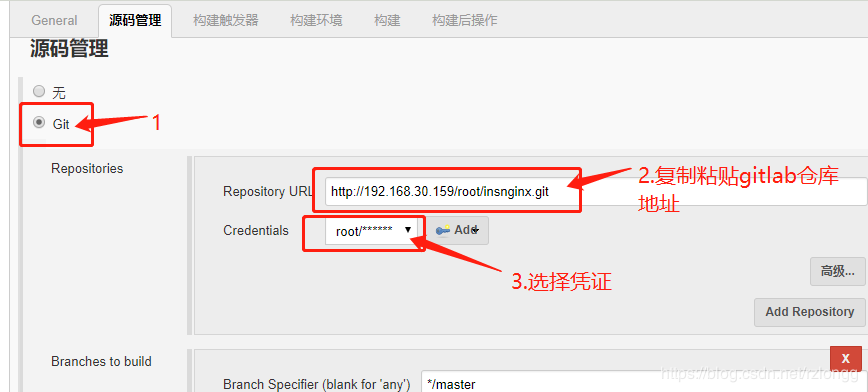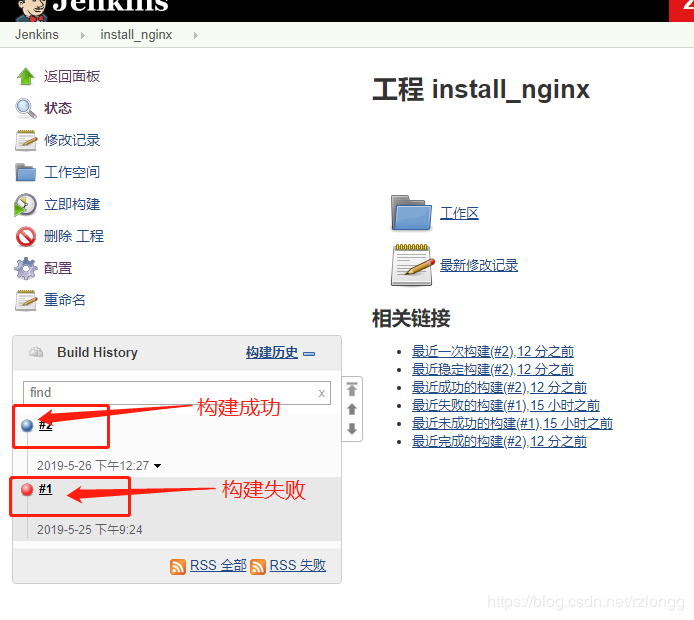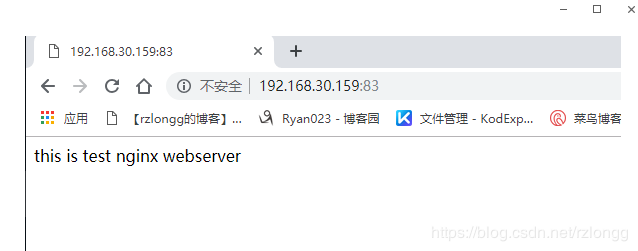引言:
首先我们可以实现一键部署网站,但在实际生产环境网站部署完成之后,我们的开发隔三差五要修改下网站的内容,难道都要我们运维手动执行命令吗?没有一种方法使得开发人员修改完代码自己测试,部署上线呢,那这就是我们这次要做的持续集成自动化部署的内容。
环境:
自动化部署nginx静态网站两台主机节点
自动化部署nginx静态网站两台主机节点 192.168.30.159:Gitlab服务,节点一 192.168.30.164:jenkins服务,Ansible工具 192.168.30.165:节点二
一、Gitlab仓库的搭建
第一步 :仓库搭建
见Gitlab仓库搭建及在linux,windows中免密使用gitlab(二)
https://blog.csdn.net/rzlongg/article/details/90576768
第二步:创建项目
这里创建一个叫insnginx

二、jenkins持续集成平台搭建
见jenkins持续集成学习(一)
https://blog.csdn.net/rzlongg/article/details/91344621
三、下载ansible自动化部署工具并编写剧本
第一步:下载ansible和git
[root@localhost insnginx]# yum -y install epel-release
[root@localhost ~]# yum -y install ansible
需下载git命令工具下载仓库以及支持jenkins凭证连接gitlab
[root@localhost ~]# yum -y install git
还需要下载nginx服务提供nginx配置文件nginx.conf
[root@localhost ~]# yum -y install nginx
第二步:创建工作目录并克隆仓库
[root@localhost ~]# mkdir /ryan [root@localhost ~]# cd /ryan [root@localhost ryan]# ls [root@localhost ryan]# git clone http://192.168.30.159/root/insnginx.git 正克隆到 'insnginx'... warning: 您似乎克隆了一个空版本库。 [root@localhost ryan]# ls insnginx [root@localhost ryan]# cd insnginx/ [root@localhost insnginx]# ls -a . .. .git ———————————————— 版权声明:本文为CSDN博主「Ryan-ruan」的原创文章,遵循 CC 4.0 BY-SA 版权协议,转载请附上原文出处链接及本声明。 原文链接:https://blog.csdn.net/rzlongg/article/details/91344877
第三步:发送秘钥或用配置文件方法
1发送秘钥
[root@localhost insnginx]# ssh-keygen Generating public/private rsa key pair. Enter file in which to save the key (/root/.ssh/id_rsa): Created directory '/root/.ssh'. Enter passphrase (empty for no passphrase): Enter same passphrase again: Your identification has been saved in /root/.ssh/id_rsa. Your public key has been saved in /root/.ssh/id_rsa.pub. The key fingerprint is: SHA256:jt0kVdhKdcTHfWTjYfEHJoCD4xeU5I0T9JR+eDoKE8w root@localhost.localdomain The key's randomart image is: +---[RSA 2048]----+ | ==oo*+o=B=| | o.=*+..++oO| | + .+=+o o+| | E .o+ o .| | oS .+ | | o+ +o | | .oo... | | . | | | +----[SHA256]-----+ [root@localhost insnginx]# ssh-copy-id 192.168.30.159 #165也需发送 /usr/bin/ssh-copy-id: INFO: Source of key(s) to be installed: "/root/.ssh/id_rsa.pub" The authenticity of host '192.168.30.164 (192.168.30.164)' can't be established. ECDSA key fingerprint is SHA256:lu7kZg1/1+q8+Uj50A8mc4swRUIn57m+98xxDVs1NXU. ECDSA key fingerprint is MD5:5b:9d:b8:ae:14:2e:65:0f:b8:bb:66:19:95:5d:33:51. Are you sure you want to continue connecting (yes/no)? yes /usr/bin/ssh-copy-id: INFO: attempting to log in with the new key(s), to filter out any that are already installed /usr/bin/ssh-copy-id: INFO: 1 key(s) remain to be installed -- if you are prompted now it is to install the new keys root@192.168.30.164's password: Number of key(s) added: 1 Now try logging into the machine, with: "ssh '192.168.30.164'" and check to make sure that only the key(s) you wanted were added. ———————————————— 版权声明:本文为CSDN博主「Ryan-ruan」的原创文章,遵循 CC 4.0 BY-SA 版权协议,转载请附上原文出处链接及本声明。 原文链接:https://blog.csdn.net/rzlongg/article/details/91344877
2.修改配置文件/etc/ansible/hosts
#在文件最后添加
[ryan] 192.168.30.167 ansible_ssh_user=root ansible_ssh_port=22 ansible_ssh_pass=root 192.168.30.168 ansible_ssh_user=root ansible_ssh_port=22 ansible_ssh_pass=root
注意:
修改配置方法不需要再清单目录和文件,且ansible一定要和jenkins安装在一台主机上,而秘钥验证ansible没有特别要求要安装在哪台主机。
第四步:创建roles相关目录编写ansible剧本
[root@localhost insnginx]# mkdir roles/nginx/{tasks,vars,template,files} -p
编写vars下文件:
[root@localhost insnginx]# vim roles/nginx/vars/main.yml port: 83 host_user: root conn: 2048 docu_root: /var/www/html
复制/etc/nginx/nginx.conf配置文件到templates下改名nginx.conf.exp并修改相关参数为变量
[root@localhost insnginx]# vim roles/nginx/templates/nginx.conf.exp user {{ host_user }}; worker_processes auto; ...... events { worker_connections {{ conn }}; } ...... server { listen {{ por }}; server_name _; root {{ docu_root }}; ...... ———————————————— 版权声明:本文为CSDN博主「Ryan-ruan」的原创文章,遵循 CC 4.0 BY-SA 版权协议,转载请附上原文出处链接及本声明。 原文链接:https://blog.csdn.net/rzlongg/article/details/91344877
编写任务文件
- copy: src=roles/nginx/files/myone.repo dest=/etc/yum.repos.d/ - yum: name=nginx state=present - template: src=roles/nginx/templates/nginx.conf.exp dest=/etc/nginx/nginx.conf - systemd: name=nginx state=restarted - copy: src=roles/nginx/files/index.html dest=/var/www/html
编写测试文件
[root@localhost insnginx]# echo "this is test nginx webserver" > roles/nginx/files/index.html
编写主机清单
[root@localhost insnginx]# ls inventory roles [root@localhost insnginx]# cat inventory/ryan [ryan] 192.168.30.159 192.168.30.164
编写剧本
[root@localhost insnginx]# vim ryan.yml [root@localhost insnginx]# cat ryan.yml - hosts: all roles: - nginx
第五步:模拟执行剧本
剧本语法检测
[root@localhost insnginx]# ansible-playbook --syntax-check ryan.yml [WARNING]: provided hosts list is empty, only localhost is available. Note that the implicit localhost does not match 'all' playbook: ryan.yml ———————————————— 版权声明:本文为CSDN博主「Ryan-ruan」的原创文章,遵循 CC 4.0 BY-SA 版权协议,转载请附上原文出处链接及本声明。 原文链接:https://blog.csdn.net/rzlongg/article/details/91344877
模拟执行
[root@localhost insnginx]# ansible-playbook -C -i inventory/ryan ryan.yml PLAY [all] ****************************************************************************************************** TASK [Gathering Facts] ****************************************************************************************** ok: [192.168.30.165] ok: [192.168.30.159] TASK [nginx : copy] ********************************************************************************************* changed: [192.168.30.165] changed: [192.168.30.159] TASK [nginx : yum] ********************************************************************************************** changed: [192.168.30.165] changed: [192.168.30.159] TASK [nginx : template] ***************************************************************************************** changed: [192.168.30.165] changed: [192.168.30.159] TASK [nginx : systemd] ****************************************************************************************** changed: [192.168.30.165] changed: [192.168.30.159] TASK [nginx : copy] ********************************************************************************************* changed: [192.168.30.159] changed: [192.168.30.165] PLAY RECAP ****************************************************************************************************** 192.168.30.159 : ok=6 changed=5 unreachable=0 failed=0 skipped=0 rescued=0 ignored=0 192.168.30.165 : ok=6 changed=5 unreachable=0 failed=0 skipped=0 rescued=0 ignored=0
第六步:提交代码至Gitlab
[root@localhost insnginx]# git config --global user.name "Administrator" [root@localhost insnginx]# git config --global user.email "admin@example.com" [root@localhost insnginx]# git add . [root@localhost insnginx]# git commit -m "v1" [master(根提交) 4861e33] v1 Committer: root <root@localhost.localdomain> 7 files changed, 128 insertions(+) create mode 100644 inventory/ryan create mode 100644 roles/nginx/files/index.html create mode 100644 roles/nginx/files/myone.repo create mode 100644 roles/nginx/tasks/main.yml create mode 100644 roles/nginx/templates/nginx.conf.exp create mode 100644 roles/nginx/vars/main.yml create mode 100644 ryan.yml [root@localhost insnginx]# git push -u origin master Username for 'http://192.168.30.159': root #Gitlab 账号 Password for 'http://root@192.168.30.159': #Gitlab的8位密码 Counting objects: 16, done. Compressing objects: 100% (8/8), done. Writing objects: 100% (16/16), 2.11 KiB | 0 bytes/s, done. Total 16 (delta 0), reused 0 (delta 0) To http://192.168.30.159/root/insnginx.git * [new branch] master -> master 分支 master 设置为跟踪来自 origin 的远程分支 master。

第七步:使用jenkins运行剧本
jenkins用户可能无法运行ansible剧本
修改/etc/sysconfig/jenkins文件以root用户运行ansible
JENKINS_USER=”root”
重启jenkins
第八步:创建jenkins任务进行构建






第九步:查看节点一二的nginx的状态,访问测试页面
[root@localhost ~]# ss -tnl | grep 83 LISTEN 0 128 *:83 *:*


四、问题汇总
报错1:

解决办法:
[root@localhost ~]# mkdir /var/www/html -p
报错2:

解决办法:跳过主机秘钥验证
vim /etc/ansible/ansible.cfg host_key_checking = false 这行的注释打开即可
报错3:

解决办法:在ansible主机上执行 ssh-copy-id 本机ip
————————————————
版权声明:本文为CSDN博主「Ryan-ruan」的原创文章,遵循 CC 4.0 BY-SA 版权协议,转载请附上原文出处链接及本声明。
原文链接:https://blog.csdn.net/rzlongg/article/details/91344877